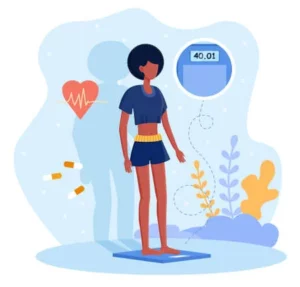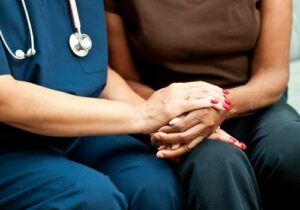Anorexia nervosa is a serious mental illness that can have deadly consequences. People who suffer from this disorder often have an unrealistic view of their own body and believe they are overweight, even when they are dangerously thin. As a result, they engage in extreme weight-loss behaviors that can seriously harm their health. In this blog post, we will discuss the dangers of anorexia nervosa and how to get help for someone who is suffering from this disorder.
Contents
Defining Anorexia Nervosa
Anorexia nervosa is an eating disorder that is characterized by severe weight loss. People with this disorder often have a distorted view of their own bodies and believe they are overweight, even when they are dangerously thin. As a result, they engage in extreme weight-loss behaviors, such as fasting, compulsive exercise, and purging. These behaviors can lead to serious health complications and even death.
It is important to note that anorexia is not the same as simply being on a diet. People with anorexia nervosa are obsessed with losing weight and will often do whatever it takes to achieve their goal, even if it means harming themselves.
Anorexia is also associated with a number of psychological problems, such as anxiety, depression, and Obsessive-Compulsive Disorder (OCD). People with this disorder often have difficulty functioning in everyday life and may need to be hospitalized.
Signs And Symptoms

There are a number of warning signs that may indicate someone is suffering from anorexia nervosa. These include:
- Severe weight loss
- Preoccupation with food and weight
- Compulsive exercise
- Denial of hunger
- Refusal to eat certain foods
- Obsession with cooking and recipes
- Intolerance to cold temperatures
- Extreme dieting behaviors, such as fasting or purging
- Isolation from friends and family
- Irritability or moodiness
Eating disorders also manifest themselves in physical forms such as:
- Fatigue
- Insomnia
- Dizziness
- Dehydration
- Muscle weakness
- Anemia
- Dark circles
- Hair loss or thinning hair
- Brittle nails
- Dry skin
If you notice any of these signs in yourself or someone you know, it is important to seek help from a medical professional. This disorder can be very difficult to overcome without treatment. It can further have deadly consequences if left untreated.
Causes
The exact cause of anorexia nervosa is unknown, but there are a number of factors that may contribute to the development of this disorder. These include:
Genetic predisposition
People with a family history of eating disorders, such as anorexia or bulimia, may be more likely to develop an eating disorder themselves. Research has also shown that people with type 1 diabetes and celiac disease are at a higher risk of developing anorexia nervosa.
Cultural influences
There is some evidence to suggest that cultural influences, such as the media’s portrayal of thinness, can contribute to the development of anorexia. In Western cultures, where thinness is often seen as a sign of beauty, people may be more likely to develop this disorder. It is also worth noting that anorexia nervosa is more common in developed countries than in developing countries.
Social comparison
People who compare themselves to others, especially when it comes to appearance, may be more likely to develop an eating disorder. This is because they may feel like they do not measure up to the “ideal” body type that is often portrayed in the media. This can also arise from feelings of inadequacy or insecurity.
Psychological factors
There are a number of psychological factors that may contribute to the development of anorexia nervosa. These include low self-esteem, perfectionism, and anxiety. People who suffer from these disorders often have difficulty coping with stress and may turn to extreme dieting behaviors as a way to cope. Other traits, such as impulsivity and compulsivity, may also contribute to the development of an eating disorder.
Bullying
People who have been bullied, especially about their weight, may be more likely to develop an eating disorder. This is because they may feel like they need to lose weight in order to avoid being bullied. It also creates a negative association with food and weight, which can further contribute to the development of an eating disorder.
Trauma
Some research has shown that people who have experienced trauma, such as sexual abuse or the death of a loved one, are more likely to develop anorexia nervosa. This is because they may use extreme dieting behaviors as a way to cope with the pain and trauma they have experienced.
Poor nutrition
People who do not have a balanced diet are more likely to develop anorexia nervosa. This is because they may be lacking in essential nutrients, such as vitamins and minerals, that are necessary for good health. It is also worth noting that people who have eating disorders often have a distorted view of nutrition, which can further contribute to the development of this disorder.
An individual may develop eating disorders due to one or a combination of these factors. It becomes important to assess these causes through professional intervention by a qualified expert.
Side Effects
Anorexia nervosa can have a number of side effects, both physically and mentally. These can either be temporary (short-term) or have chronic (long-term) effects. These include:
Short Term Effects
Short terms effects of anorexia nervosa include:
- Fatigue
- Low stamina
- Fainting
- Migraines
- Muscle aches and pains
- Shortness of breath
- Cold intolerance
- Tooth decay
- Mouth ulcers
- Hypertension
- Swelling in hands and feet
- Bloating
- Excessive facial hair
- Slow metabolism
- Bad breath
- Poor social interactions
These effects manifest themselves as physical, mental or emotional signs.
Long Term Effects

- Slow or irregular heart rate
- Low blood pressure
- Kidney damage
- Risks of cardiac arrest
- Liver problems
- Irritable bowel syndrome (IBS)
- Electrolyte imbalances
- Rectal bleeding
- Swollen gums
- Osteoporosis
- Gallstones
- Irregular menstrual cycles (for women)
- Infertility
- Bruised internal organs
- Development of seizures
- Hormonal imbalance
- Abnormal brain activity
- Anxiety disorders
- Social isolation
- Depression
- Suicidal thoughts or attempts
As we can see, anorexia nervosa is a serious disorder with a number of dangerous side effects. If you or someone you know is suffering from anorexia, it is important to seek professional help as soon as possible. With proper treatment, people with this disorder can recover and live healthy, happy lives.
Diagnosis
If you think you may be suffering from anorexia nervosa, it is important to see a doctor or mental health professional as soon as possible. They will be able to assess and further diagnose you. Some of the most common tools for psychological testing used to diagnose anorexia nervosa include:
- The Diagnostic and Statistical Manual of Mental Disorders (DSM-V)
- The Eating Disorder Inventory (EDI-III)
- The Minnesota Starvation Experiment
These are just a few of the many tools available to help diagnose anorexia nervosa.
In addition to psychological evauation, you can also expect a physical exam. This is because anorexia nervosa can have a number of physical side effects, as we saw in the previous section. Some of the tests that may be performed during a physical exam include:

- Blood tests
- Urinalysis
- Weight and height measurements
- Body mass index (BMI) calculation
- EKG or electrocardiogram
- Bone density test
- CT scan or MRI
- X-rays
As you can see, there are a number of ways to diagnose anorexia nervosa. If you think you may be suffering from this disorder, it is important to seek professional help as soon as possible. With proper diagnosis and treatment, people with this disorder can recover and live a healthy life!
Treatment Options
Anorexia can be a difficult disorder to treat, but there are a number of options available. The best course of action will vary from person to person, so it is important to speak with a doctor or mental health professional to figure out what is best for you. The treatment plan can also differ on the basis of the severity of the symptoms. Some of the most beneficial treatment options for anorexia include:
Therapy

Therapy is the process of talking to a trained professional about your thoughts, feelings and experiences. This can be an effective treatment option for anorexia nervosa, as it can help you to understand your disorder and develop coping mechanisms.
Some of the most common therapeutic interventions used for managing anorexia include:
- Psychotherapy: This is a type of therapy that helps people with anorexia nervosa to understand and change the thoughts and behavior that contribute to their disorder.
- Cognitive behavioral therapy (CBT): This is a type of therapy that helps people with anorexia nervosa to identify and further change the negative thought patterns that contribute to their disorder.
- Interpersonal therapy (IPT): This is a type of therapy that helps people with anorexia nervosa to improve their relationships with others.
- Family-based treatment (FBT): This is a type of therapy that involves the family in the treatment of an individual with anorexia nervosa.
- Dialectical behavior therapy (DBT): This is a type of therapy that helps people with anorexia nervosa to manage their emotions. It also helps them to develop coping skills.
- Support groups: These are groups of people who share similar experiences and can provide support and advice to one another. It can also help to build a sense of community.
The right type of therapy for you will be decided by your respective therapist based upon your comfort and requirements.
Nutritional counseling
Nutritional counseling is an important part of treatment for treating anorexia. It works to educate people with this disorder about nutrition and healthy eating habits. It can also help them to develop a positive relationship with food.
Counseling for nutrition also typically involves meal planning. This can help people with anorexia nervosa to make sure they are getting the nutrients they need. It can also help to prevent weight gain.
A registered dietitian can help you to develop a healthy eating plan and make sure that you are getting the nutrients you need. They may also work in collaboration with psychologists to assess and evaluate the mental and emotional connection to food.
Medication
There are no specific medications for the treatment of anorexia nervosa. However, there are some medications that can be used to treat the symptoms associated with this disorder. These include:
- Antidepressants: These medications can be used to treat the depression and anxiety that often accompany anorexia.
- Selective serotonin reuptake inhibitors (SSRIs): These are antidepressants that can help to treat anxiety, depression, and Obsessive-Compulsive Disorder (OCD).
- Atypical antipsychotics: These are medications that can help to treat the symptoms of psychosis and treat the hallucinations and delusions that may occur in people with anorexia.
- Stimulants: These medications can be used to increase appetite and help with weight gain.
- Mood stabilizers: These medications can help to stabilize the mood swings that often accompany anorexia.
It is crucial to note that medication should not be used as a sole treatment for anorexia nervosa. Rather, it should be used in conjunction with other forms of treatment, such as therapy and nutritional counseling. It is also important to stay in touch with your healthcare provider to monitor the potential side effects and benefits of the medication on your condition.
Hospitalization

In some cases, people with anorexia nervosa may need to be hospitalized. This is usually done when a person is severely malnourished or at risk for medical complications. Hospitalization can also help prevent suicide or self-harm. This is typically done when a person is at risk for medical complications or if they are severely underweight.
During hospitalization, a person with anorexia nervosa will be monitored closely. They will also be provided with meals and nutrition education. In some cases, they may also receive counseling and therapy.
This is beneficial in extremely severe cases as it can help to stabilize a person’s health. It also gives them time to focus on their recovery without the distraction of everyday life. It can also provide a structured environment where people with anorexia can receive around-the-clock care and supervision.
Self Coping Strategies
In addition to professional treatment, there are some self-coping strategies that can be used to manage anorexia nervosa. These include:
- Eating regular meals: This can help to increase appetite and also prevent weight loss.
- Avoiding fad diets: Fad diets can often trigger disordered eating habits.
- Exercising regularly: Exercise can help to improve mood and reduce stress. However, it is important to avoid over-exercising, as this can lead to further weight loss.
- Keeping a food diary: This can help to identify patterns and triggers that may contribute to anorexia nervosa.
- Avoiding trigger foods: This can help to avoid the temptation of binge eating.
- Learning about nutrition: Nutrition education can help people with anorexia nervosa make better food choices and develop healthier eating habits.
- Identifying triggers: It is important to identify the thoughts, feelings, and behaviors that trigger disordered eating. This can help to prevent relapse.
- Building a support network: A support network of family and friends can provide emotional support and advice. It is also important to find a therapist or counselor that you trust.
Anorexia nervosa is a serious mental illness that can have dangerous consequences. It is a serious and potentially deadly eating disorder that should not be taken lightly. There are many resources available to those who need help. If you or someone you know is struggling with anorexia, it is important to seek professional help. There are many treatment options available, and the right one for you will be based on your individual needs.
Conclusion
Anorexia nervosa is a dangerous mental illness with potentially deadly consequences. However, there are many resources and treatment options available to those who need help. If you or someone you know is struggling with anorexia, it is important to seek professional help. With the right treatment, recovery is possible.
Please note that this blog post is for informational purposes only and should not replace professional medical advice. If you are struggling with an eating disorder, please see your doctor or mental health professional for help.
If you are searching for reliable, effective, confidential as well as pocket-friendly mental health assistance for anorexia or any other mental health concerns, reach out to Mantra Care! We have a team of expert mental health professionals from all across the globe. They are here to offer the best quality support and guidance in your healing journey. You can book a session with us or download our free Android or iOS app.


